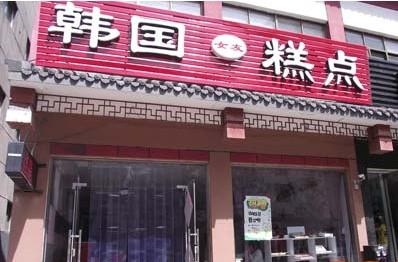
Business
商業(yè)
Bakers and chaebol in South Korea
韓國的糕點店與財閥
Let them eat cake
讓小店也分一杯羹
A half-baked effort to curb the conglomerates
控制財閥的笨辦法
SOME parents give their children cakes. A few give them cake shops.
有些父母會給孩子買蛋糕吃,而有一些則會給他們開蛋糕店。
The hot topic in South Korea is the trend for daughters and grand-daughters of chaebol families to open bakeries and other small food outlets.
如今,韓國人熱議的話題是財閥家族紛紛給他們的女兒和孫女們開糕點店和其他小型飲食店。
The chaebol are the conglomerates that dominate the Korean economy, so these plutocratic patissières have deeper pockets than any of the little bakers they compete against.
這些財閥都是掌控韓國經(jīng)濟命脈的企業(yè)集團,所以這些糕點商的財力比任何一家與之競爭的小糕點店都要雄厚。
Their baking has provoked outrage.
財閥紛紛開糕點店的行為激怒了人們。
Lee Myung-bak, South Korea's president, calls it a "hobby" business for rich girls that threatens the livelihood of poor shopkeepers.
韓國總統(tǒng)李明博稱之為富家千金威脅貧窮店主生計的一個"愛好"產業(yè)。
Lee Ju-young, a member of the national assembly, likens it to Park Ji-sung (Manchester United's Korean midfielder) lording it over amateurs in a backstreet game of football.
國會議員李舉勇將這比做樸智星(效力于曼聯(lián)的韓國中場球員)在一場后街足球比賽里對所有的業(yè)余球員稱王稱霸。
A restaurateur in Seoul puts it more plaintively: "These families already control everything else in Korea. Why can't they leave something for the rest of us?"
首爾一家餐館老板的說法則更悲哀:"這些家族已掌控了韓國的一切,他們?yōu)槭裁淳筒荒芙o別人留點余地呢?"
The chaebol families have decided that this is not a battle worth picking.
這些財閥家族已認識到這場仗不值得打。
Scions of the Samsung, LG and Hyundai dynasties are all hanging up their aprons.
三星、LG、現(xiàn)代這幾個家族企業(yè)的富家千金們都準備退出糕點業(yè)了。
Artisee, a chain of swanky pastry shops run by Lee Boo-jin, whose dad is the chairman of Samsung, is to close. So is the Hyundai-affiliated Ozen.
由三星董事長的女兒李寶金經(jīng)營的高級糕點連鎖店Artisee即將停業(yè),現(xiàn)代集團的Ozen也同樣如此。
Whether this will help small bakers much is open to question.
但仍不清楚這樣是否會對小糕點店大有幫助。
Artisee has only 27 shops; Ozen a mere two. Both are cupcakes in comparison to SPC Group, which operates more than 3,000 Paris Baguette shops in Korea.
Artisee只有27家分店,Ozen則只有2家;但與SPC集團相比,這不過是小巫見大巫。SPC集團在韓國擁有超過3000家巴黎貝甜糕點店,
Buns have always been SPC's bread and butter—and its boss is not an heiress.
小圓面包一直是SPC的主要產品,而且其老板也不是富家千金。
Some say all this pie-throwing distracts attention from the real problems that overmighty chaebol cause. Entrepreneurs complain that if they have a good idea, the chaebol show up with their chequebooks and poach their staff.
有人說,這種胡亂攤派責任的做法分散了人們的注意力,令人們忽視了這些勢力強大的財閥引發(fā)的真正問題。
Small firms that supply chaebol complain that they are ruthlessly squeezed, though few dare say so publicly.
企業(yè)家們抱怨說,如果他們想出了一個好點子,財閥就會現(xiàn)身用重金挖走他們的員工。財閥的小型供應商則抱怨它們遭到財閥無情的壓榨,但沒哪家敢公開這樣說。
Consumers also suffer.
消費者的利益也受到了損害。
Korea's Fair Trade Commission (FTC) detected over 3,500 cases of price-fixing in 2010, but only 66 led to fines. The average penalty amounted to just 2.3% of unfairly earned revenue.
韓國公平交易委員會(FTC)在2010年查明了超過3500宗哄抬價格案,但只有66宗最終是以財閥被罰款告終;平均罰款數(shù)僅占財閥以不公平手段賺取的利潤的2.3%。
Samsung and LG were fined in January for fixing the prices of notebook PCs and flat-screen televisions between June 2008 and September 2009.
1月,三星和LG因在2008年6月至2009年9月哄抬筆記本電腦和平板電視的價格而被罰款。
Samsung was ordered to pay a fine of 25.8 billion won ($23m); LG, 18.8 billion won. LG's fine is to be waived, in return for co-operation with the FTC.
三星被勒令支付兩百五十八億韓元(兩千三百萬美元)的罰款;LG則要支付一百八十八億韓元。LG因配合FTC的調查而得以被免除罰款。
This is the third time the two firms have been caught price-fixing in the past two years.
這是這兩家公司在過去兩年內第三次被發(fā)現(xiàn)進行價格哄抬。
Politicians follow the same old recipes when dealing with the chaebol. They lean on banks to lend cash to small firms. And they lean on the chaebol to stay out of a few minor businesses, such as baking or tofu-making.
政客們在對付財閥時用的仍是老一套:向銀行施壓,讓其貸款給小公司;向財閥施壓,不讓其插足一些小行業(yè),如糕點或豆腐制作。
However you sugarcoat it, this is not serious reform.
但無論如何粉飾,這些都不是真正意義上的改革。











